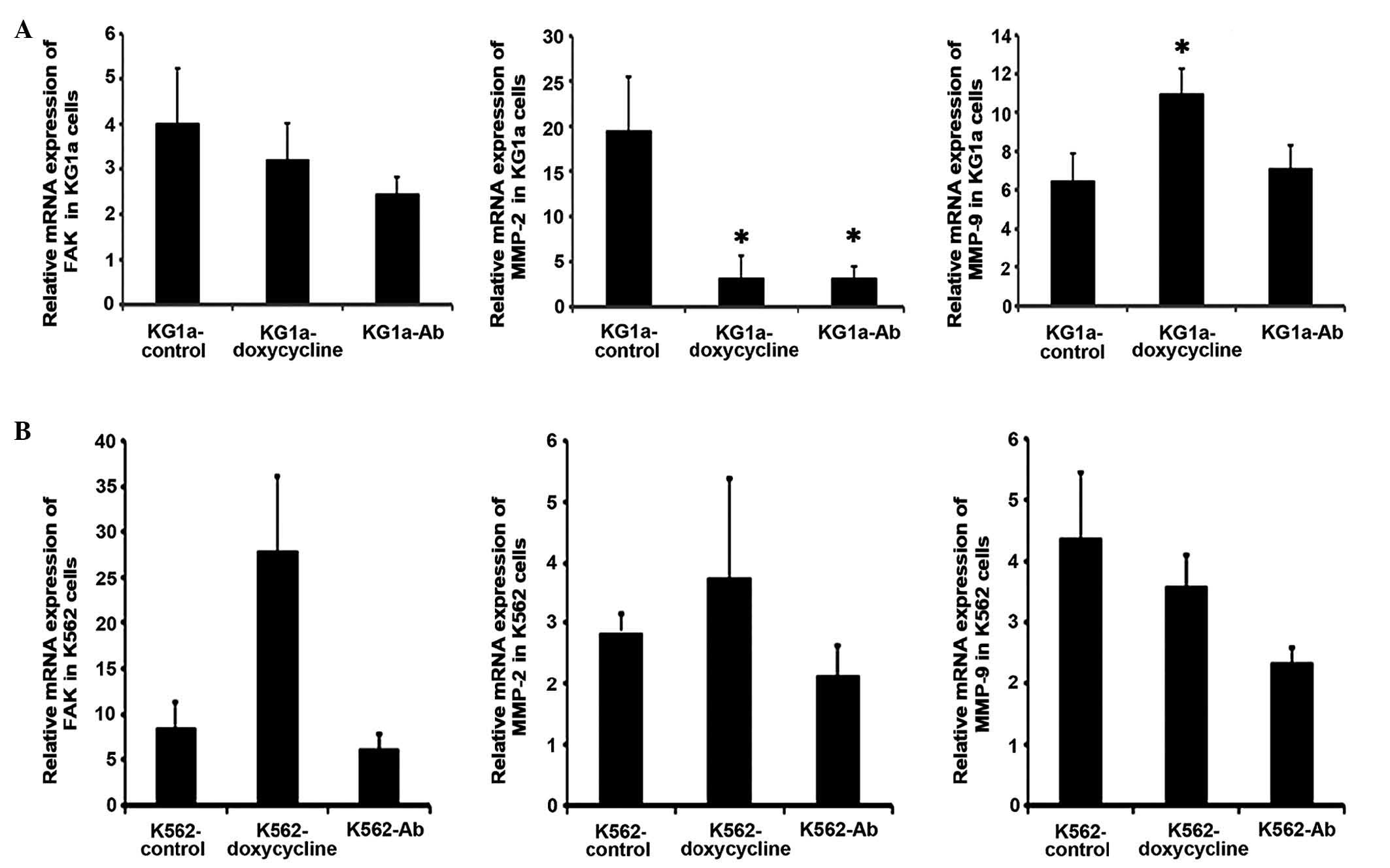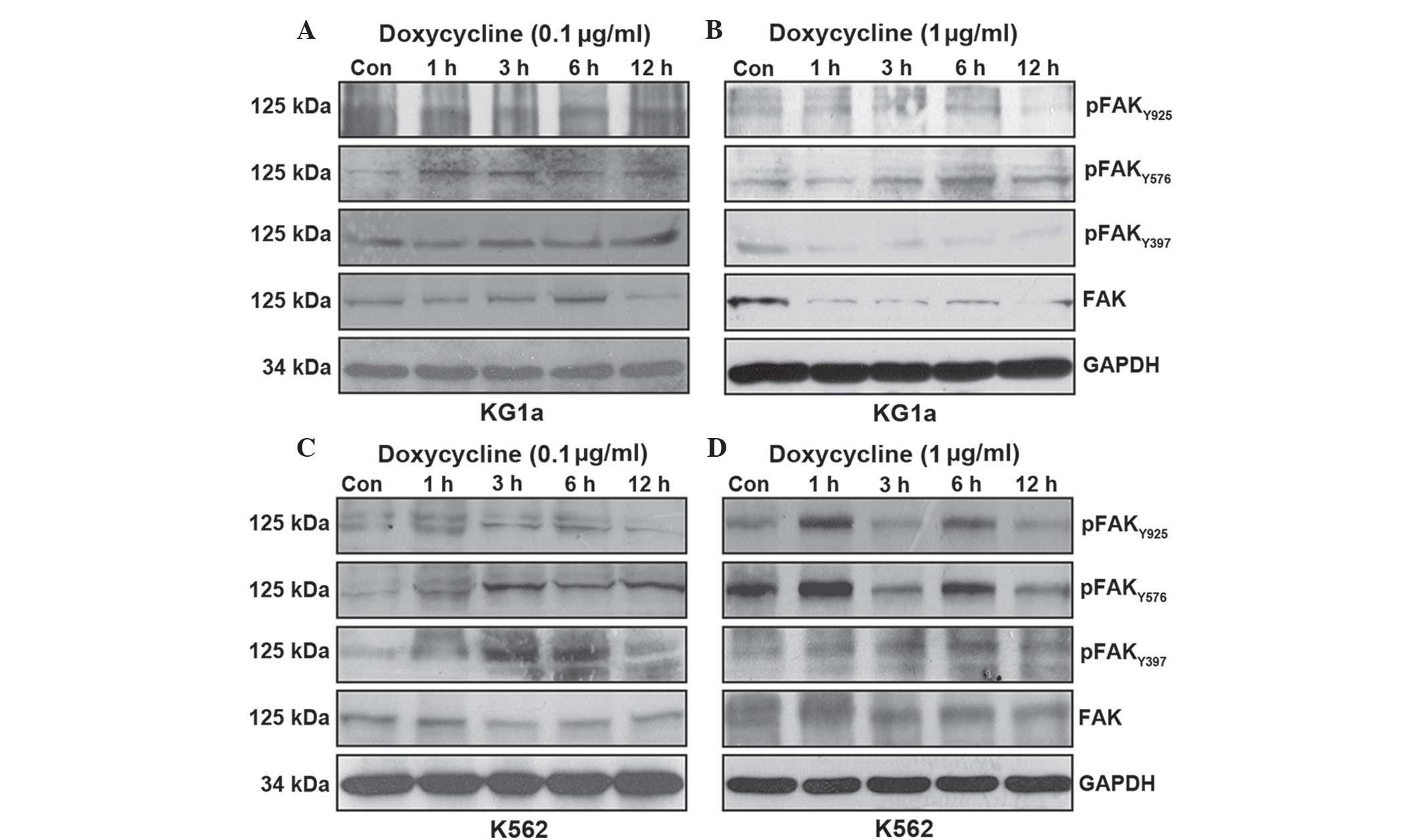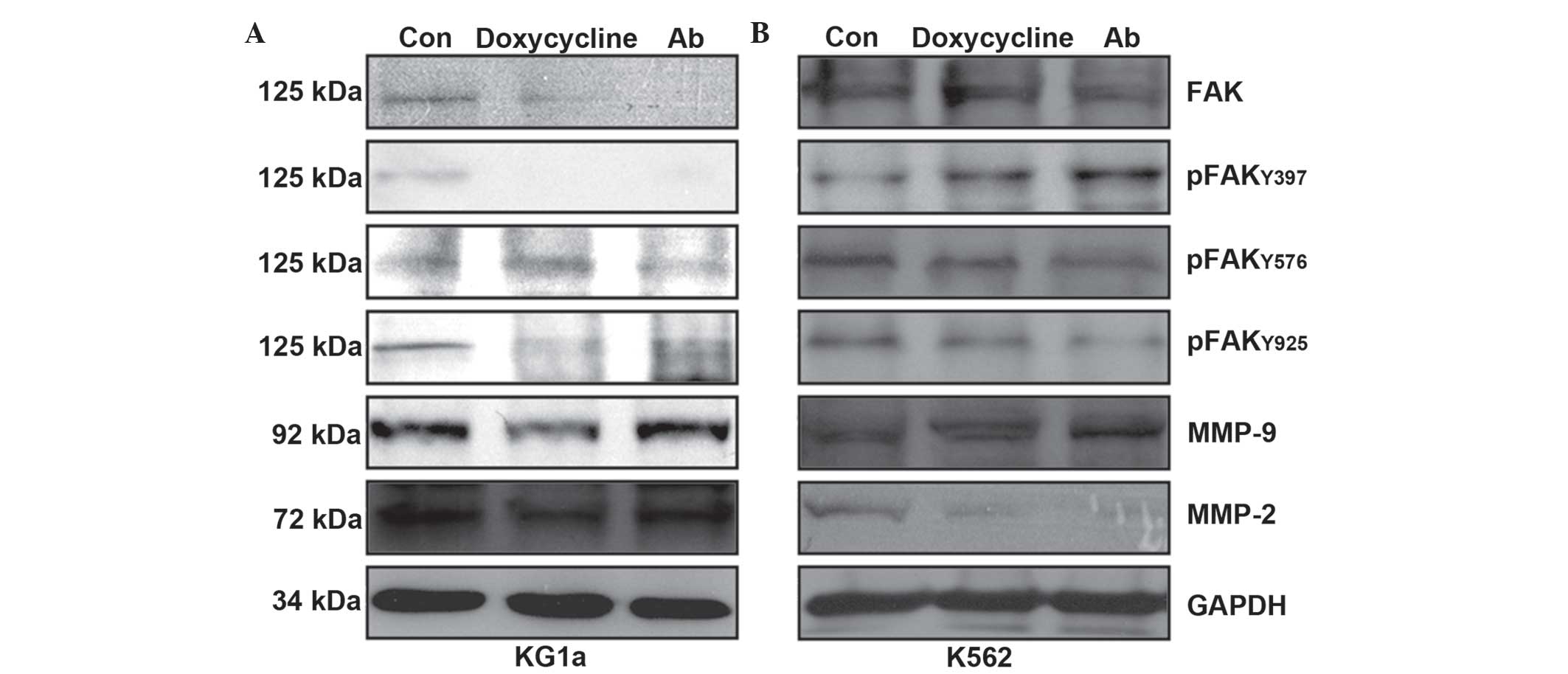|
1
|
Chiang AC and Massagué J: Molecular basis
of metastasis. New Engl J Med. 359:2814–2823. 2008. View Article : Google Scholar : PubMed/NCBI
|
|
2
|
Friedl P and Alexander S: Cancer invasion
and the microenvironment: Plasticity and reciprocity. Cell.
147:992–1009. 2011. View Article : Google Scholar : PubMed/NCBI
|
|
3
|
Nagase H and Woessner JF Jr: Matrix
metalloproteinases. J Biol Chem. 274:21491–21494. 1999. View Article : Google Scholar : PubMed/NCBI
|
|
4
|
Egeblad M and Werb Z: New functions for
the matrix metalloproteinases in cancer progression. Nat Rev
Cancer. 2:161–174. 2002. View
Article : Google Scholar : PubMed/NCBI
|
|
5
|
McLean GW, Carragher NO, Avizienyte E,
Evans J, Brunton VG and Frame MC: The role of focal-adhesion kinase
in cancer - a new therapeutic opportunity. Nat Rev Cancer.
5:505–515. 2005. View
Article : Google Scholar : PubMed/NCBI
|
|
6
|
Rolain JM, Boulos A, Mallet MN and Raoult
D: Correlation between ratio of serum doxycycline concentration to
MIC and rapid decline of antibody levels during treatment of Q
fever endocarditis. Antimicrob Agents Chemother. 49:2673–2676.
2005. View Article : Google Scholar : PubMed/NCBI
|
|
7
|
Fife RS, Sledge GW Jr, Sissons S and
Zerler B: Effects of tetracyclines on angiogenesis in vitro. Cancer
Lett. 153:75–78. 2000. View Article : Google Scholar : PubMed/NCBI
|
|
8
|
Iwasaki H, Inoue H, Mitsuke Y, Badran A,
Ikegaya S and Ueda T: Doxycycline induces apoptosis by way of
caspase-3 activation with inhibition of matrix metalloproteinase in
human T-lymphoblastic leukemia CCRF-CEM cells. J Lab Clin Med.
140:382–386. 2002. View Article : Google Scholar : PubMed/NCBI
|
|
9
|
Fife RS, Sledge GW Jr, Roth BJ and Proctor
C: Effects of doxycycline on human prostate cancer cells in vitro.
Cancer Lett. 127:37–41. 1998. View Article : Google Scholar : PubMed/NCBI
|
|
10
|
Tu G, Xu W, Huang H and Li S: Progress in
the development of matrix metalloproteinase inhibitors. Curr Med
Chem. 15:1388–1395. 2008. View Article : Google Scholar : PubMed/NCBI
|
|
11
|
Sun T, Zhao N, Ni CS, et al: Doxycycline
inhibits the adhesion and migration of melanoma cells by inhibiting
the expression and phosphorylation of focal adhesion kinase (FAK).
Cancer Lett. 285:141–150. 2009. View Article : Google Scholar : PubMed/NCBI
|
|
12
|
Mitra SK, Hanson DA and Schlaepfer DD:
Focal adhesion kinase: in command and control of cell motility. Nat
Rev Mol Cell Biol. 6:56–68. 2005. View
Article : Google Scholar : PubMed/NCBI
|
|
13
|
Freireich EJ: Acute leukemia. A prototype
of disseminated cancer. Cancer. 53:2026–2033. 1984. View Article : Google Scholar : PubMed/NCBI
|
|
14
|
Janowska-Wieczorek A, Marquez LA,
Matsuzaki A, et al: Expression of matrix metalloproteinases (MMP-2
and -9) and tissue inhibitors of metalloproteinases (TIMP-1 and -2)
in acute myelogenous leukaemia blasts: comparison with normal bone
marrow cells. Br J Haematol. 105:402–411. 1999. View Article : Google Scholar : PubMed/NCBI
|
|
15
|
Recher C, Ysebaert L, Beyne-Rauzy O, et
al: Expression of focal adhesion kinase in acute myeloid leukemia
is associated with enhanced blast migration, increased cellularity
and poor prognosis. Cancer Res. 64:3191–3197. 2004. View Article : Google Scholar : PubMed/NCBI
|
|
16
|
Berken A, Abel J and Unfried K:
beta1-integrin mediates asbestos-induced phosphorylation of AKT and
ERK1/2 in a rat pleural mesothelial cell line. Oncogene.
22:8524–8528. 2003.PubMed/NCBI
|
|
17
|
Ramakers C, Ruijter JM, Deprez RH and
Moorman AF: Assumption-free analysis of quantitative real-time
polymerase chain reaction (PCR) data. Neurosci Lett. 339:62–66.
2003. View Article : Google Scholar : PubMed/NCBI
|
|
18
|
Hanks SK, Ryzhova L, Shin NY and Brabek J:
Focal adhesion kinase signaling activities and their implications
in the control of cell survival and motility. Front Biosci.
8:d982–996. 2003. View
Article : Google Scholar : PubMed/NCBI
|
|
19
|
Adimora AA: Treatment of uncomplicated
genital Chlamydia trachomatis infections in adults. Clin Infect
Dis. 35(Suppl 2): S183–S186. 2002. View
Article : Google Scholar : PubMed/NCBI
|
|
20
|
Olson MW, Ruzin A, Feyfant E, Rush TS III,
O'Connell J and Bradford PA: Functional, biophysical and structural
bases for antibacterial activity of tigecycline. Antimicrob Agents
Chemother. 50:2156–2166. 2006. View Article : Google Scholar : PubMed/NCBI
|
|
21
|
Fife RS and Sledge GW Jr: Effects of
doxycycline on in vitro growth, migration and gelatinase activity
of breast carcinoma cells. J Lab Clin Med. 125:407–411.
1995.PubMed/NCBI
|
|
22
|
Pilkington GJ, Parker K and Murray SA:
Approaches to mitochondrially mediated cancer therapy. Semin Cancer
Biol. 18:226–235. 2008. View Article : Google Scholar : PubMed/NCBI
|
|
23
|
Kroon AM, Dontje BH, Holtrop M and Van den
Bogert C: The mitochondrial genetic system as a target for
chemotherapy: tetracyclines as cytostatics. Cancer Lett. 25:33–40.
1984. View Article : Google Scholar : PubMed/NCBI
|
|
24
|
van den Bogert C, van Kernebeek G, de Leij
L and Kroon AM: Inhibition of mitochondrial protein synthesis leads
to proliferation arrest in the G1-phase of the cell cycle. Cancer
Lett. 32:41–51. 1986. View Article : Google Scholar : PubMed/NCBI
|
|
25
|
Sun B, Zhang S, Zhang D, et al:
Doxycycline influences microcirculation patterns in B16 melanoma.
Exp Biol Med (Maywood). 232:1300–1307. 2007. View Article : Google Scholar
|
|
26
|
Saikali Z and Singh G: Doxycycline and
other tetracyclines in the treatment of bone metastasis.
Anti-cancer Drugs. 14:773–778. 2003. View Article : Google Scholar : PubMed/NCBI
|
|
27
|
Gilmore AP, Owens TW, Foster FM and
Lindsay J: How adhesion signals reach a mitochondrial
conclusion-ECM regulation of apoptosis. Curr Opin Cell Biol.
21:654–661. 2009. View Article : Google Scholar : PubMed/NCBI
|
|
28
|
Sieg DJ, Hauck CR, Ilic D, et al: FAK
integrates growth-factor and integrin signals to promote cell
migration. Nat Cell Biol. 2:249–256. 2000. View Article : Google Scholar : PubMed/NCBI
|
|
29
|
Golubovskaya VM and Cance W: Focal
adhesion kinase and p53 signal transduction pathways in cancer.
Front Biosci. 15:901–912. 2010. View
Article : Google Scholar
|
|
30
|
Costa P, Scales TM, Ivaska J and Parsons
M: Integrin-specific control of focal adhesion kinase and RhoA
regulates membrane protrusion and invasion. PLoS One. 8:e746592013.
View Article : Google Scholar : PubMed/NCBI
|
|
31
|
Duivenvoorden WC, Vukmirović-Popović S,
Kalina M, Seidlitz E and Singh G: Effect of zoledronic acid on the
doxycycline-induced decrease in tumour burden in a bone metastasis
model of human breast cancer. Br J Cancer. 96:1526–1531. 2007.
View Article : Google Scholar : PubMed/NCBI
|
|
32
|
Mon NN, Ito S, Senga T and Hamaguchi M:
FAK signaling in neoplastic disorders: a linkage between
inflammation and cancer. Ann N Y Acad Sci. 1086:199–212. 2006.
View Article : Google Scholar : PubMed/NCBI
|
|
33
|
Dutta A, Sen T and Chatterjee A: Culture
of K562 human myeloid leukemia cells in presence of fibronectin
expresses and secretes MMP-9 in serum-free culture medium. Int J
Clin Exp Pathol. 3:288–302. 2010.PubMed/NCBI
|
|
34
|
Wang C, Chen Z, Li Z and Cen J: The
essential roles of matrix metalloproteinase-2, membrane type 1
metalloproteinase and tissue inhibitor of metalloproteinase-2 in
the invasive capacity of acute monocytic leukemia SHI-1 cells. Leuk
Res. 34:1083–1090. 2010. View Article : Google Scholar : PubMed/NCBI
|
|
35
|
Liesveld JL, Winslow JM, Frediani KE, Ryan
DH and Abboud CN: Expression of integrins and examination of their
adhesive function in normal and leukemic hematopoietic cells.
Blood. 81:112–121. 1993.PubMed/NCBI
|
|
36
|
Guo-Bao W, Xiao-Qin C, Qi-Rong G, Jie L,
Gui-Nan L and Yue L: Arsenic Trioxide overcomes cell
adhesion-mediated drug resistance through down-regulating the
expression of beta (1)-integrin in K562 chronic myelogenous
leukemia cell line. Leuk Lymphoma. 51:1090–1097. 2010. View Article : Google Scholar : PubMed/NCBI
|
|
37
|
Cheng SY, Sun G, Schlaepfer DD and Pallen
CJ: Grb2 promotes integrin-induced focal adhesion kinase (FAK)
autophos-phorylation and directs the phosphorylation of protein
tyrosine phosphatase alpha by the Src-FAK kinase complex. Mol Cell
Biol. 34:348–361. 2014. View Article : Google Scholar :
|
|
38
|
Brunton VG, Avizienyte E, Fincham VJ, et
al: Identification of Src-specific phosphorylation site on focal
adhesion kinase: dissection of the role of Src SH2 and catalytic
functions and their consequences for tumor cell behavior. Cancer
Res. 65:1335–1342. 2005. View Article : Google Scholar : PubMed/NCBI
|
|
39
|
Katz BZ, Romer L, Miyamoto S, et al:
Targeting membrane-localized focal adhesion kinase to focal
adhesions: roles of tyrosine phosphorylation and SRC family
kinases. J Biol Chem. 278:29115–29120. 2003. View Article : Google Scholar : PubMed/NCBI
|
|
40
|
Li S, Butler P, Wang Y, et al: The role of
the dynamics of focal adhesion kinase in the mechanotaxis of
endothelial cells. Natl Acad Sci USA. 99:3546–3551. 2002.
View Article : Google Scholar
|
|
41
|
Brinckerhoff CE and Matrisian LM: Matrix
metalloproteinases: a tail of a frog that became a prince. Nat Rev
Mol Cell Biol. 3:207–214. 2002. View
Article : Google Scholar : PubMed/NCBI
|
|
42
|
Lundell BI, McCarthy JB, Kovach NL and
Verfaillie CM: Activation-dependent alpha5beta1 integrin-mediated
adhesion to fibronectin decreases proliferation of chronic
myelogenous leukemia progenitors and K562 cells. Blood.
87:2450–2458. 1996.PubMed/NCBI
|

















